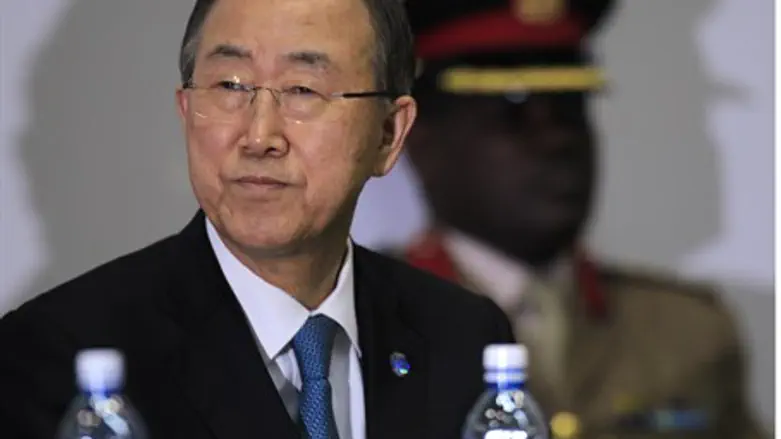
In welcoming the long-term ceasefire in Gaza, United Nations (UN) Secretary-General Ban Ki-moon voiced hope on Tuesday that it will set the stage for talks on a final Israeli-Palestinian Authority (PA) peace deal.
"The secretary-general remains hopeful that the extended ceasefire will act as a prelude to a political process as the only way of achieving durable peace," UN spokesman Stephane Dujarric said, according to AFP.
Ban warned that "a brighter future for Gaza and for Israel depends on a sustainable ceasefire" and that "any violations of the ceasefire would be utterly irresponsible."
The UN chief also urged the sides to address the root causes of the crisis that have led to three wars in six years in Gaza.
The United Nations stands ready to support efforts to address the "structural factors of conflict" between Israel and Gaza, the UN spokesman said, according to AFP.
Ban cited the return of the Palestinian Authority (PA) to Gaza. PA Chairman Mahmoud Abbas’s Fatah movement was chased out of Gaza by Hamas, which staged a bloody coup of the territory in 2007.
Reiterating that a two-state solution was the only viable option for peace, Ban called on the sides to return to negotiations on a final peace deal.
UN Security Council diplomats have put forward the idea of a monitoring mechanism to impartially report on ceasefire violations and verify the flow of goods into the Gaza Strip.
Key powers at the council are concerned that without proper verification of the ceasefire provisions, war could easily be reignited in Gaza.
A document floated by Britain, France and Germany last week called on Ban to come up with proposals for such a mechanism and for leading a massive reconstruction effort in Gaza.
Under Tuesday’s ceasefire agreement, there will be an immediate easing of restrictions on the two main crossings between Israel and Gaza to allow in aid and reconstruction supplies.
Significantly, construction materials needed to repair the water network, electricity grid and mobile phone networks will be allowed in along with humanitarian aid, food and medical supplies. It should be noted that Israel continued supplying humanitarian goods throughout most of Operation Protective Edge.
As for the Gaza fishing zone, restrictions will be lifted immediately to extend the zone to six nautical miles from the shore, to be extended later to 12 miles. Over the past eight years, Israel has set a six-nautical-mile limit for Gaza's fishermen when tensions were lower, restricting it to three miles when hostilities have escalated.
